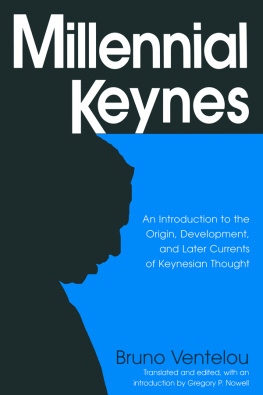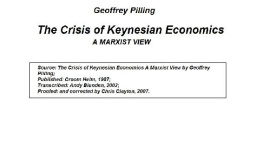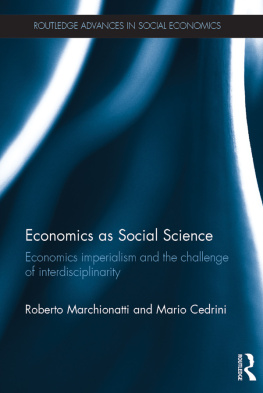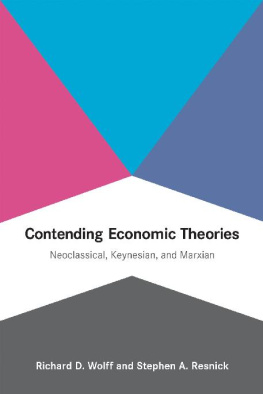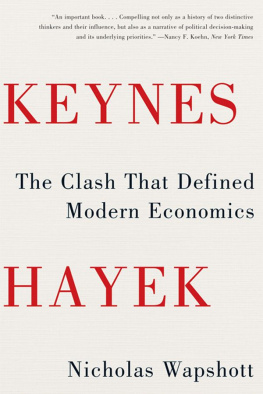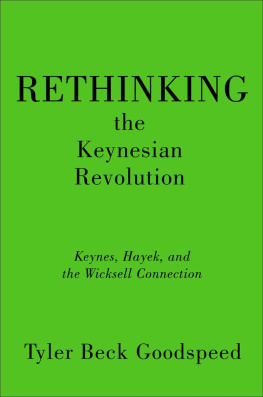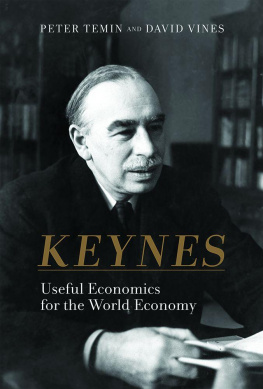Millennial
Keynes
Millennial
Keynes
An Introduction to the Origin, Development and Later Currents of Keynesian Thought
Bruno Ventelou
Translated and edited with an introduction by Gregory P. Nowell
First published 2005 by M.E. Sharpe
Published 2015 by Routledge
2 Park Square, Milton Park, Abingdon, Oxon OX14 4RN
711 Third Avenue, New York, NY 10017, USA
Routledge is an imprint of the Taylor & Francis Group, an informa business
English translation copyright 2005 Taylor & Francis. All rights reserved.
No part of this book may be reprinted or reproduced or utilised in any form or by any electronic, mechanical, or other means, now known or hereafter invented, including photocopying and recording, or in any information storage or retrieval system, without permission in writing from the publishers.
Notices
No responsibility is assumed by the publisher for any injury and/or damage to persons or property as a matter of products liability, negligence or otherwise, or from any use of operation of any methods, products, instructions or ideas contained in the material herein.
Practitioners and researchers must always rely on their own experience and knowledge in evaluating and using any information, methods, compounds, or experiments described herein. In using such information or methods they should be mindful of their own safety and the safety of others, including parties for whom they have a professional responsibility.
Product or corporate names may be trademarks or registered trademarks, and are used only for identification and explanation without intent to infringe.
Library of Congress Cataloging-in-Publication Data
Ventelou, Bruno.
[Lire Keynes et le comprendre. English]
Millennial Keynes : an introduction to the origin, development, and later currents ofKeynesian thought / Bruno Ventelou; translated and edited, with an introduction byGregory P. Nowell.
p. cm.
Translation of: Lire Keynes et le comprendre.
Includes bibliographical references and index.
ISBN 0-7656-0670-4 (cloth : alk. paper) ISBN 0-7656-1516-9 (pbk. : alk. paper)
1. Keynesian economicsTextbooks. I. Nowell, Gregory P. (Gregory Patrick), 1954II. Title.
HB99.7. V42613 2004
330.156dc22 |
2003070437 |
ISBN 13: 9780765615169 (pbk)
ISBN 13: 9780765606709 (hbk)
Contents
Gregory R Nowell
Bruno Ventelou would like to thank his colleagues and mentors who helped with the French edition of this book, as well as the students who used early drafts of the manuscript in their coursework. Gregory Nowell would like to thank Alan Isaac, Gary Mongiovi, Fiona Machlachlan, Mine Doyran, and others who helped with the review of the manuscript, the preparation of this translation, and revisions of the introduction. Professors Ventelou and Nowell collaboratively rewrote some portions of this book, which in effect has become a second revised edition, rather than a direct translation.
Millennial
Keynes
Gregory P. Nowell
Thus our argument leads toward the conclusion that in contemporary conditions the growth of wealth, so far from being dependent on the abstinence of the rich, as is commonly supposed, is more likely to be impeded by it. One of the chief social justifications of great inequality of wealth is, therefore, removed.
Keynes, General Theory
The motivating spirit of Keynesian economics depends on two core ideas: that social equity is the key to making capitalism sustainable, and that to achieve social equity there must be a national commitment to full employment and to income redistribution. The emphases on employment and redistribution are direct reflections of the crises of the pre-World War II era, but we do no violence to Keynes in adding, in our own time, environmental protection and quality of life to the goal of social equity.
Keynes faced two sorts of international crises in his lifetime. The first was the collapse of the European economy after World War I. Keynes argued passionately that excessive debt burdens in the wake of this war not just the reparations imposed on Germany but debts contracted by all the nations of Europewould crush their collective economies. His call for a general bonfire (Economic Consequences of the Peace, 281) of debt was an appeal to free Europes laborers and capitalists from the catastrophic misjudgments of their governments. He darkly warned of tyrannies and communist experiments that would otherwise emerge, and in the event he was largely proved right.
At the same time, Keyness other chief recommendation, that trade liberalization in Europe would encourage economic recovery, anticipated contemporary policies. The United States and the International Monetary Fund invariably respond to economic crises by pushing for more trade liberalization. The thrust of Keyness early arguments was that, absent vindictive reparations policies and punitive trade restrictions on Germany, the natural force of capitalism would lead Europe toward recovery from the crisis of the war.
Keyness arguments in Economic Consequences of the Peace had recognizable liberal, in the sense of laissez-faire, ancestry. The victorious Allied governments interested in postwar Europes recovery needed only to shed the irrational pursuit of measures designed to strangle Germanys industrial potential. The underlying thought was similar to that of Smith in the Wealth of Nations: wealth and prosperity are the best guarantors of peaceful relations among states, and governments ought not to pursue power at the expense of the collective wealth that would best ensure security.
The second international crisis was the Great Depression. Here Keynes dropped the premises that underlay the Economic Consequences of the Peace. He came instead to the conclusion, common to more radical analyses of that time, that the economic system was not self-remedying and did not have the natural impulse to recovery he had formerly imputed to capitalism. The insights that Keynes developed in this period are really the core of Professor Ventelous valuable introductory book on Keynesian economics and how it developed. Whereas World War I could leave Keynes with the impression that an exogenous shockwar and its aftermathcould be held accountable for the economic collapse, the diagnosis in the pathbreaking General Theory of Employment, Interest, and Money was that endogenous shocksspecifically a failure of investors to behave in a manner that optimized the output of goods and services and thus employmentwere an equally grave threat to capitalist economies.
In both the early and later works, the tone of Keyness arguments contrasts sharply with the comparative complacency of most modern economics: with the rise of the Soviet Union and the totalitarian fascist economies, Keynes understood that capitalism itself was precariously founded on its ability to deliver essential goods and services and to maintain itself in the face of grim social alternatives. His economic theory presents itself not so much as the exposition of eternal mathematical laws as the intellectual foundation for institutionalizing equity and full employment as social goals. No intellectual in the 1930s, much less Keynes, could take "capitalism" for granted as a social system. It was therefore wise to explore the ways in which capitalisms production of goods and services could be optimized and made attractive enough to make it socially stable in the face of grave historical challenges.
Next page
